 まなみちゃん
まなみちゃん初心者が一番苦労する、短時間で理由付けのアイデアが出せる
5分類法を紹介!
特に、パート5~7(応答問題)、パート11(意見問題)
が苦手な人は必見!



TOEIC Speakingで、僕のような初心者(100~130)で、
中級者(140~160)を目指す方にぴったりの内容!
▼この記事の動画版もあるので、もし良かったら流し聞きでどうぞ!▼
2022年4月9日(土) 20:00~21:00
「ワールドトーク」 kohay先生(第4回)
1.Speakingアイデア5分類法
<アイデア出しの5分類>
①お金面、経済面(money, economy)
②環境面(environment)
③健康面(health)
④教育面、学習面(education, learning)
⑤利便性(convenience)
5分類法が有効な理由
選択肢過多効果 → 選択肢が多すぎると実際使えなくなる
Q1 どこで使用する?
SpeakingのQ5~7(応答問題)、Q11(意見問題)
+Writing(Q8エッセイ問題)で使用
Q2 この順番になっている理由は?
→特に優先順位順ではない。ただ、⑤は最後に使うかんじになる。
Q3 Speakingでは②環境面はあまり使わない気がするが?
→確かにそうだが、表現を覚えていればWritingでは有効に使える。
↓↓以下、①~⑤で使える有効な表現
①お金面・経済面(money, economy)
save 節約する(save money)
earn 稼ぐ
boost the economy 経済を活性化させる
affordable お手ごろな(cheapの代わりに使う)
economical 経済的である
reasonable お手ごろな
waste money 無駄遣いする
②環境面(environment)
environmentally–friendly 環境にやさしい
eco-friendly 環境にやさしい
sustainable 持続可能な
harm the environment 環境にダメージを与える
(It might harm the environment.)
lead to 環境汚染(global warming, air pollution)
→Too much use of cars may lead to global warming.
自動車の使いすぎは地球温暖化につながる可能性がある
③健康面(health)
healthy 健康的である(Jogging in the morning is very healthy.)
keep fit 健康を維持する
obesity 肥満
mentally depressed 精神的に落ち込んだ状態
(Young people tend to be mentally depressed.)
spend a sedentary life 座りっぱなしの生活をする
(→ obesity, backache)
lead to 病名
detrimental effect on 身体
(悪影響,有害な効果, Too much use of your smartphone has a detrimental effect on your eyesight.)
④教育面・学習面(education, learning)
educational 教育的である(道徳的なことも含む)
instructive 学びになる(何かをした結果 技術とか知識とかがしっかり身につく)
informative 勉強になる(情報をたくさん体得できる)
can learn a lot of things
enable you to learn a lot of things
(主語を人じゃなくて 物にしたい場合,
Smartphones may enable you to learn a lot of things.)
make children lazy 子供を怠け者にしてしまう
⑤利便性(convenience)
convenient (便利な.)
useful (役に立つ)
helpful (助けになる)
help you 動詞の原形
allow you to do
of 抽象名詞
A is very useful. → A is of utmost use.(great use)
A is important. → A is of importance.
2.Speaking180点の取り方(応答問題編)
Speaking 180
応答問題のポイント
Part5,6&7:それぞれ3文、3文、10文以上で答える。
通常、2文は作れそうな要素は入っているので
3文目は「具体化」で作る!
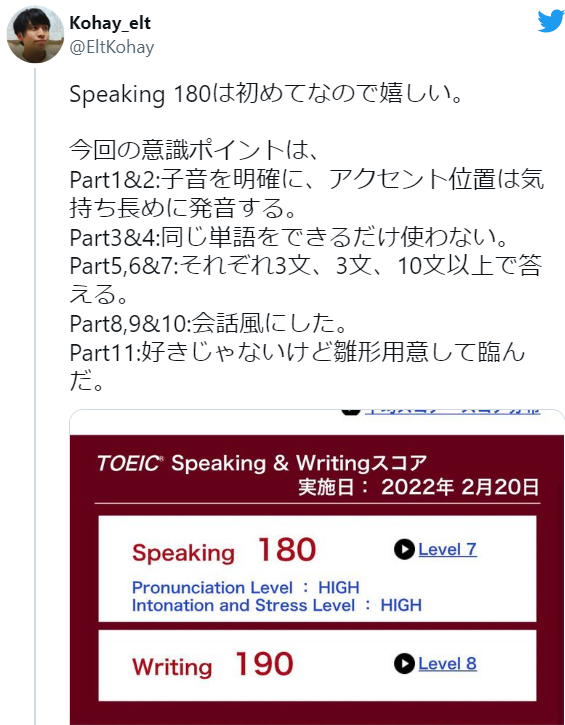

例① In your free time, when and where do you typically read?
I typically read in the morning.
I like to read at home.
↓ 具体化
I usually read a series of Harry Potter.
or
I read books from 8 a.m. to 9 a.m.
例② How many grocery stores are in your neighborhood, and can you walk to them?
There are three grocery stores in my neighborhood.
I can walk to them.
And it takes 3 minutes to get to all grocery stores.
There is / There are 構文
There are 数字 ○○ 場所
~がいくつありますという表現
It takes 時間 to get there.
~に到着するのに○○かかる
3.Q&A(WeとYouの違い)
Q 「we」か「you」どっち使う?
・Speaking意見問題、writingエッセイ問題、具体例書くとき、「we」か「you」どっちを使うか迷います。(いつもwe使うのですが、参考書の例だとyou使ってたりで、よく分からないです。)
A 結論としては、「you」を使った方が無難。
・総称のyou (everyone, people)
・we 私たち(一種のグループ間(属性)がある表現)
・対局にtheyがある
4.今日の気づき点
・初心者だからと
ずっと平易な単語しか使わないというのはダメで
「意図的に」効果的な表現を入れて行かないと
点数は上がりづらいということ
・環境面、教育面については
難しいというよりは
「興味がないから 語彙がなかった」
というだけだった気がした
▼使っている参考書

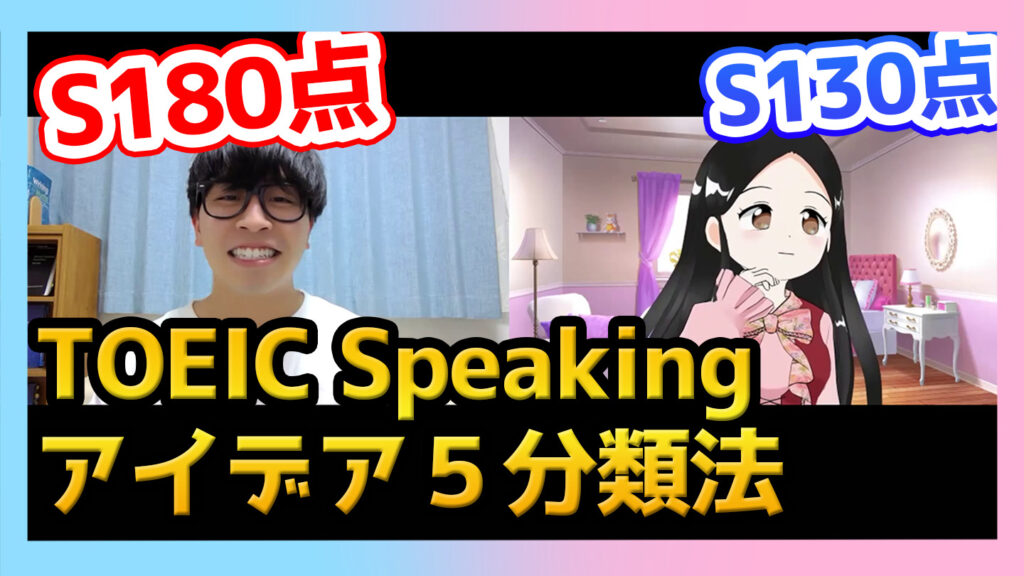

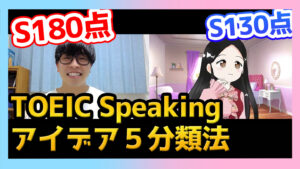
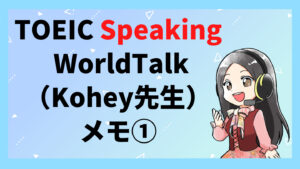

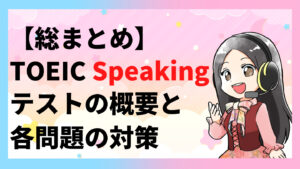



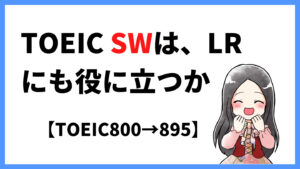

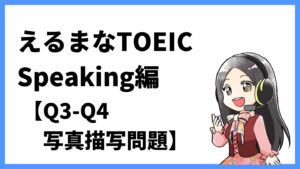
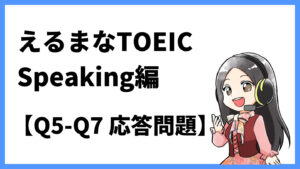
コメント